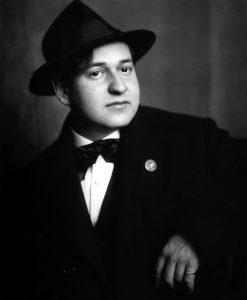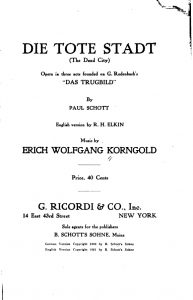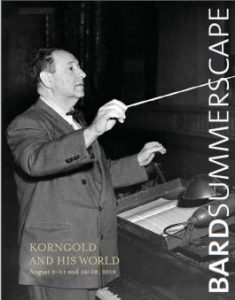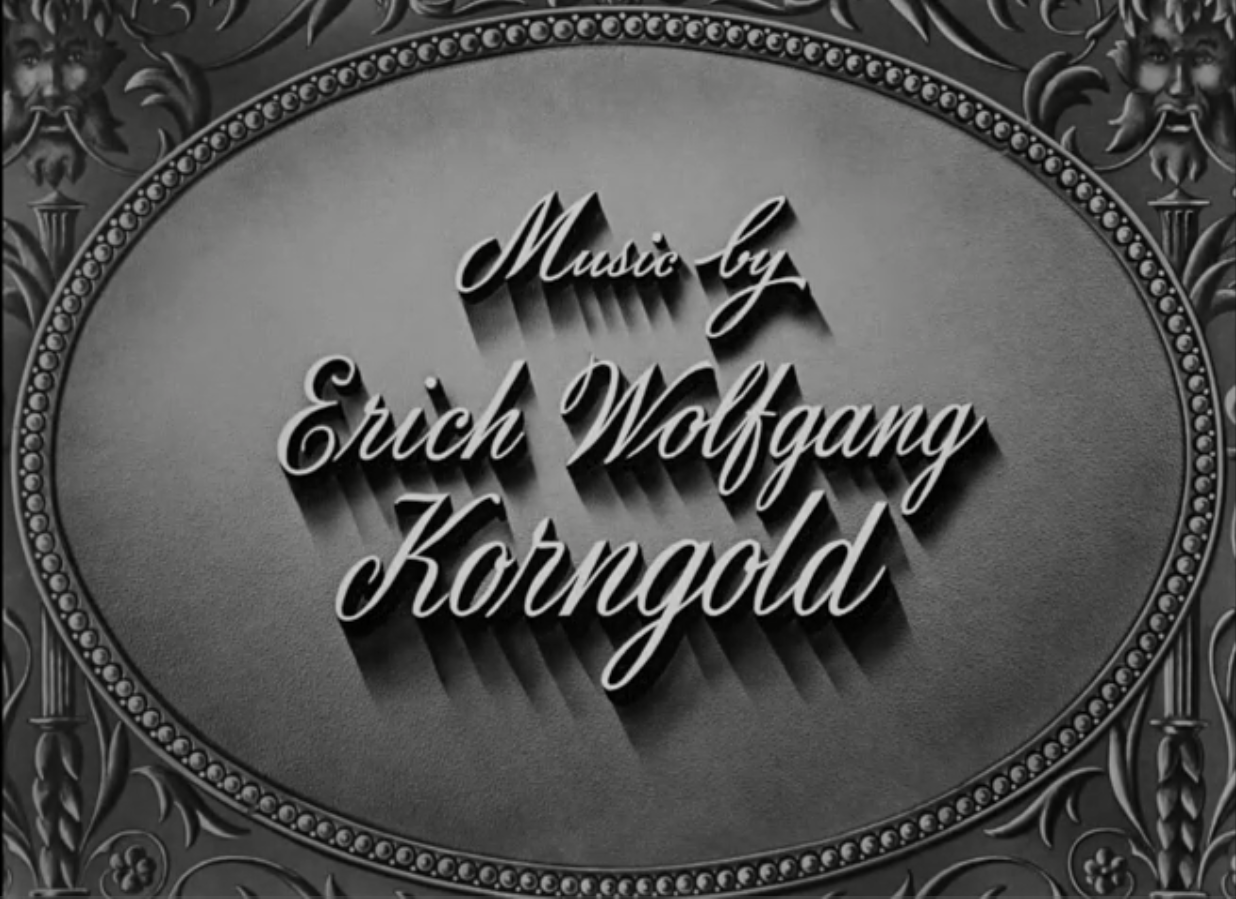Bard Music Festival keys on Korngold
Screenshot of an opening credit from the 1947 film Escape Me Never. The life and music of Erich Wolfgang Korngold will be featured at this year’s Bard Music Festival.
Some years ago, this reporter dialed up WBJC’s Friday night request show and asked host Reed Hessler if he had anything by Korngold.
“Hmmmm, Korngold,” Hessler thoughtfully replied. “He wrote mostly for the movies, so I doubt we have anything by him in our library. But as I’m thinking now about the symphonic quality of his scores, perhaps we should.”
Three decades or so later, Korngold’s catalog has thankfully reemerged. And not just at WBJC.
Korngold may be heard regularly today on the FM dial through studio recordings by André Previn and Charles Gerhardt, to name just two. And in rousing live performances by the BBC Proms and no less a virtuoso than Baltimore’s own: Hilary Hahn.
For those arriving late to the party — to borrow a line from the Korngold-scored The Adventures of Robin Hood — “Welcome to Sherwood, M’Lady!”

Erich Wolfgang Korngold (1897–1957) is perhaps “The greatest composer you’ve never heard of.” Korngold began his career as a classical prodigy in fin-de-siècle Vienna, becoming a respected opera composer at just 19 years of age.
His renown in his native Austria drew the attention of impresario Max Reinhardt, who brought Korngold to Hollywood in the mid-1930s. There — with the coming of World War II — he would eventually reside as a celebrated exile and cinema composer par excellence.
But for all his Hollywood success — with scores for such films as Captain Blood, Anthony Adverse, The Private Lives of Elizabeth and Essex, The Sea Hawk, The Constant Nymph, The Sea Wolf, and Kings Row — Korngold died embittered by the icy reception that greeted him when he tried to return to the post-war European stage.
To celebrate the 30th Anniversary of the Bard Music Festival, the selection committee boldly chose to feature the life and work of Erich Wolfgang Korngold.
It’s a choice that Eleanor Davis – Director of Public Relations at Bard College – calls unique.
“Every year the Bard Music Festival features the music of a particular composer – something of a ‘This Is Your Life’ retrospective,” explained Davis. “They focus on contemporaries, proteges, influences, and try to pull out the music that is not well known.
“They also produce a book of essays about the featured composer. Those books are used quite a bit in academia.
“After our 15th year of doing the Bard Music Festival, we constructed a big concert hall, which led to the SummerScape Festival. SummerScape includes dance, theatre, and a fully-staged opera and is informed by the Bard Music Festival.

(Peter Aaron ’68/Esto)
“Because this is the 30th Anniversary of the music festival, SummerScape’s opera is also by the same composer. We usually don’t do it that way. It’s usually a contemporary of our featured composer or it is thematic. So doing a big Korngold opera, along with making him our featured composer, is truly unique.
“I think that uniqueness has spurred a lot of interest.”
Davis said the fully-staged opera that is being performed for this year’s SummerScape – The Miracle of Heliane (“Das Wunder der Heliane,” 1927) – is also unique in that it had never been staged in the United States.
“The Dead City (“Die tote Stadt” 1920) – which is the final performance for the Bard Music Festival (Aug 18) – was really the genesis for all the programming. That one has been performed stateside, but it’s the first time we have ever done it here,” said Davis.
Davis added that – unlike The Miracle of Heliane – The Dead City will not be fully staged.
(SummerScape’s The Miracle of Heliane features a full orchestra along with a 50-member ensemble.)
“Korngold is different from the other composers we’ve done,” continued Davis, “because you have this chapter where he is in Vienna – doing much more traditional classical music – then moving somewhat reluctantly to Hollywood. As far as our programming, it is broken down neatly into the two jouers.

(The Dead City).
“I’m a big fan of chronology, and in the program, you will see the cultural and artistic world in which Korngold both lived and was influenced by him.”
Korngold influenced several well-known contemporaries, such as Max Steiner and Alfred Newman, and later composers such as John Williams. We asked Davis if this is the first time the Bard Music Festival has featured a composer with Hollywood credits?
“Yes! And I think this is the first time we’ve done a composer of what you might consider popular music.”
What have Korngold fans been saying about the festival?
“What seems to pop up in conversation with fans who have attended the opera is that Korngold was a child prodigy whose father was a music critic who followed him to Hollywood. Now that’s an interesting aspect.
“Another interesting aspect is that Korngold only stayed in Hollywood because of the Anschluss (annexation) of Austria by the Nazi’s. A lot of the melodies and scores he wrote in Hollywood clearly referenced the work he’d already done in Vienna – what we would consider the more significant compositions.
“I find that transition – the Americanization of his work – very interesting. In our second weekend of programming, we’ll see how that transition manifested its way in Hollywood. Weekend One touches more on how European composers viewed America and what the influences were.”
The final performance of The Miracle of Heliane will take place on Sunday, August 4 at 2 PM at The Richard B. Fisher Center for the Performing Arts at Bard College. SummerScape will conclude with a partially-staged performance of Die tote Stadt on Sunday, August 18.
An overview of the Bard Music Festival reads in part:

Drawing on recent scholarship, the Bard Music Festival’s signature thematic programming, multidisciplinary approach, and emphasis on context and reception history provide the perfect platform for a reappraisal of this beleaguered legacy, revisiting Korngold’s neglected concert repertoire, remembering his role as an operetta adapter, and doing full justice to his achievement in synthesizing 19th-century operatic practices with those of 20th-century cinema. Through the prism of his life and career, the festival explores themes including the importance of popular music, the orchestral imagination, musical conservatism in the Modernist age, the Third Reich’s impact on Jewish musicians in Europe, and the development of music for film.
The festival will feature a broad sampling of Korngold’s own music, including childhood masterpieces, rare orchestral and chamber works, excerpts from iconic film scores, a special screening of The Constant Nymph, and a semi-staged production of his best-loved opera, Die tote Stadt, to draw the entire seven weeks of SummerScape to a riveting close. Music by many of his compatriots and contemporaries will also be heard, including those who dominated the Viennese music scene in his early years, such as Mahler, Strauss, Robert Fuchs, Joseph Marx, and his teacher Alexander von Zemlinsky; his fellow conservatives, such as Ernst von Dohnányi and Franz Schmidt; those with whom he was unfavorably compared, such as Franz Schreker, Ernst Krenek, and Paul Hindemith; Broadway legends such as Jerome Kern, George Gershwin, and Leonard Bernstein; and some of the cinematic giants he influenced, such as Max Steiner, Alfred Newman, Bernard Herrmann, Franz Waxman, and Miklós Rózsa, several of whom – together with Arnold Schoenberg, Hanns Eisler, Erich Zeisl, and Korngold himself – were also Jewish émigrés in Hollywood. To elucidate each concert’s themes, there will be informative pre-concert talks and commentaries, supplemented by two thought-provoking panel discussions; these are free to ticket holders.
For more information – including dates and performance times – please visit The Bard Music Festival.

Anthony C. Hayes is an actor, author, raconteur, rapscallion and bon vivant. A one-time newsboy for the Evening Sun and professional presence at the Washington Herald, Tony’s poetry, photography, humor, and prose have also been featured in Smile, Hon, You’re in Baltimore!, Destination Maryland, Magic Octopus Magazine, Los Angeles Post-Examiner, Voice of Baltimore, SmartCEO, Alvarez Fiction, and Tales of Blood and Roses. If you notice that his work has been purloined, please let him know. As the Good Book says, “Thou shalt not steal.”

